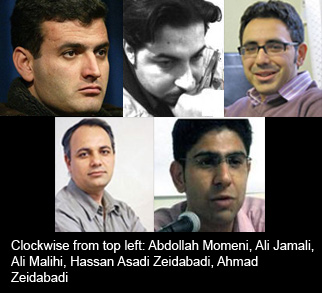Release Unjustly Imprisoned Student Leaders
 (6 October 2010) The International Campaign for Human Rights in Iran today called for the immediate release of five jailed leaders of the student alumni group Advar Tahkim Vahdat, and for an investigation by both Iranian and UN authorities, recently mandated to focus on the Freedom of Association, into their detention, trials, and torture and ill-treatment in prison.
(6 October 2010) The International Campaign for Human Rights in Iran today called for the immediate release of five jailed leaders of the student alumni group Advar Tahkim Vahdat, and for an investigation by both Iranian and UN authorities, recently mandated to focus on the Freedom of Association, into their detention, trials, and torture and ill-treatment in prison.
The five imprisoned leaders of the group, one of the most respected civil society organizations in Iran, include Ahmad Zeidabadi, Abdollah Momeni, and Ali Malihi, as well as Ali Jamali and Hassan Asadi Zeidabadi. The recent arrests of the latter two leaders are seen as an effort to disable Advar in order to quell student activities as the academic year begins.
“The detention and torture of Advar leaders is a brutal attempt to decapitate a constructive civil society group, and to intimidate student activism,” according to Aaron Rhodes, a spokesperson for the Campaign.
“But rather than discouraging demands for freedom and reform, the unjust and illegal imprisonment of student leaders exacerbates tensions,” he added.
Ahmad Zeidabadi was awarded the Golden Pen of Freedom at the 17th World Editors Forum in Hamburg today for promoting press freedom and showing courage in the face of persecution. Zeidabadi is Advar’s Secretary General and holds a PhD in International Relations. He was arrested in the immediate aftermath of the tainted 2009 presidential election and is serving a sentence including six years in prison and “lifetime deprivation of any political activity.” Zeidabadi has suffered inhumane treatment, without a single day of leave during the past year-and-a-half, while confined at Rajaee Shahr Prison, a detention center for high risk criminals, drug addicts and drug dealers.
Advar’s spokesperson, Abdollah Momeni, was arrested on 21 June 2009, and is serving a prison sentence of four years and eleven months. When his wife and brother visited him in Evin prison on 8 August 2009, they reported that he was so weak he could not walk unassisted, and that he appeared dazed with bruises on his face. Last month, Momeni wrote a letter to Iran’s Leader, Ayatollah Khamenei, telling him of his torture and ill- treatment in prison.
Central Council member Ali Malihi was arrested on 2 February 2010 and deprived of access to his lawyer for several months. Malihi was sentenced to four years in prison on charges of “congregation and collusion against the regime,” “propagation against the regime,” “participation in illegal gatherings,” “publication of falsehoods,” and “insulting the president,” a sentence upheld by an appeals court. According to his family, he has been severely tortured.
The arrests in August 2010 of other active members of the group’s Central Council are an attempt to put an end to the organization’s activities before the start of the academic year, and part of a more general policy to disenfranchise civil society organizations.
Ali Jamali was arrested on 22 August, after having been threatened and summoned by security officials, and is reportedly in solitary confinement. Charges against him pertain to statements and position papers published by Advar.
Hassan Asadi Zeidabadi was also arrested on 22 August when his home was stormed by security forces, and has been charged with “congregation and collusion against the regime,” “creating public anxiety,” and “propagating against the regime.” He is confined in Ward 240 of Evin prison.
The International Campaign for Human Rights in Iran urges the Iranian Judiciary to open investigations into Abdollah Momeni’s report of prison torture and physical and psychological abuse, and evidence of unfair, inhumane, and illegal conduct on the part of the interrogators and judges as regards the detention and sentencing of other Advar members.
The Campaign also urges the new United Nations mandate on Freedom of Association, established by the Human Rights Council at its 15th Session, to take up the persecution and prosecution of Advar as an egregious violation of Iran’s obligations to protect the Freedom of Association as a state party to the International Convention on Civil and Political Rights.






